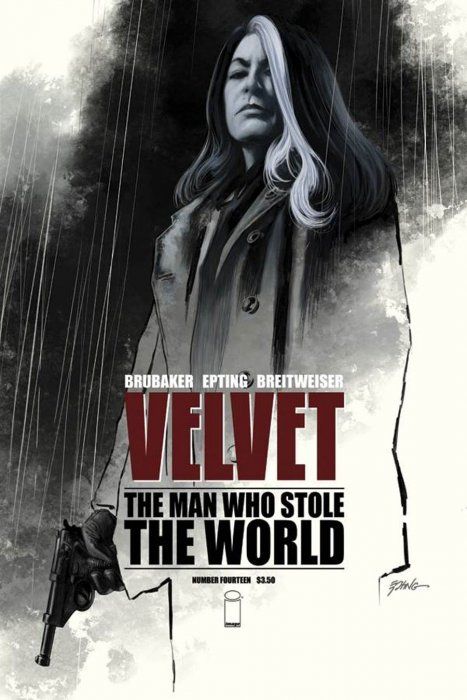In Ed Brubaker and Steve Epting's "Velvet" #14, Velvet continues to pursue the secret behind X-14's death until she realizes that her best bet is to speak with the President of the United States, Richard Nixon. On that premise alone, this should have been a standout issue, but it turns out to be disappointing.
Brubaker begins by turning the narrative to Colt, who has become impressed by Velvet the more he stays just one step behind her. It's an old twist for the hunter to become sympathetic to his quarry. However, even though it feels too familiar, I still enjoyed it when Colt pushes back and says, "I don't think anything she does is obvious, Senator." When the point of view shifts back to Velvet, though, the pace slackens. In the flashback to the events of the previous week, Velvet's mood gets depressive and frankly emo as she indulges in self-recrimination, guilt and regrets.
While Velvet remains sympathetic, the internal dialogue in the captions is too melodramatic. Brubaker wants to show the human cost of this investigation and manhunt, both to Velvet and to the other people who got caught in the crossfire. Nevertheess, when Velvet throws her glass against the wall and rages about her "pride," there was no pathos because it was too cliche. Velvet is a great character, but torturing her emotionally is getting old, even if that's a staple of the genre.
Epting has some gorgeous visuals that really play up this mood, especially the glassy bottom rim of a beer can and the plume of cigarette smoke. Breitweiser is wisely restrained on the color in this panel, giving the furniture and walls only light tints of green-blue and golden browns. As Velvet talks herself around, Breitweiser's mix of peaches and yellows capture the comfort and glow of old-fashioned incandescent lighting after dark.
There's a lot of action in the rest of Velvet's week, but none of it carries much traction. That's not to say the art is any less skillful; Epting draws a spot-on likeness of Tricky Dick, and his perspective and facial expressions when the president feels ill are so convincing that they'll evoke a sympathetic clenching in the reader's stomach.
The panel with "Agent 69" and a Vice President was more explicit than necessary and came off as a gratuitously crude attention-grabber. It reads like a symptom that something's missing. The involvement of the Vice President and President in the conspiracy is curiously boring. For the first time, I have doubts about whether the payout that's coming will live up to the buildup accumulating since the first issue.
While it was fun to see how Velvet arranged for some alone time with President Nixon, the ruses she employs in "Velvet" #14 aren't clever or elaborate compared to her earlier gambits. The pacing here feels rushed, and Velvet's interrogation of Nixon is anticlimactic because it hides everything and reveals nothing. Brubaker plays too much with the reader's trust. He jumps over Nixon's confession, but has Velvet tease the reader with "he tells me everything I want to know." This draws out the suspense too overtly and too obviously, and -- on top of that betrayal -- there's another over-the-top cliche as Velvet says "what's left of my heart breaks one more time."
Epting's pacing and composition gently set up the reader for a surprise on the last page. The cliffhanger carries a punch, though the impact is softened because it's a common twist in the spy genre and in comics.
Players at the highest levels of government are revealed and another is brought back into the game, but -- in terms of dramatic impact -- the storytelling in "Velvet" #14 feels like it's treading water.

